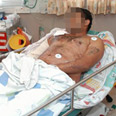
Nahariya hospital
Photo: Niv Calderon

Injured Hizbullah operative
Photo: Ronny Albert
The hospital in Nahariya received hundreds of injured Israeli civilians and soldiers in the recent month. Sunday morning, after receiving a 5:30 a.m. call from the IDF, the hospital received a patient of a different nationality: A Hizbullah operative, aged 27, suffering from shrapnel wounds in his chest and arms. After preliminary tests, the man's condition was declared moderate.
A number of hours later, the operative was transferred to the 'Poriya' hospital in Tiberias, in order to distance him from wounded IDF soldiers who are hospitalized in Nahariya. As expected, the operative's arrival in an Israeli hospital caused quite a reaction in the Israeli and international media. The man underwent medical tests with military policemen standing guard at all times.

Injured Hizbullah operative treated in Israeli hospital (Photo: Ronny Albert)
Originally, the operative seemed to be under the impression that he was in a Lebanese hospital or UN outpost on Lebanese soil, however, due to the Hebrew conversations around him, he eventually understood that he had been taken prisoner. To the journalists straining to interview him, he released only one sentence: "Tell my family I am alive, injured, and receiving medical treatment."
A number of hours later, a few hospital workers managed to get a little information from the operative. "My name is Abdullah Nasser and I only ask that my family be told that I'm alive and wounded," he said. "Believe me, I'm sorry about this war and everything it's caused. Now I only hope for peace and that I'll be able to return home. We didn't hear of a ceasefire, our fighters in the field were told nothing of such a thing."
Dr. Moshe Daniel, deputy director of the hospital in Nahariya, told Ynet that "'Any patient that enters our hospital receives the best treatment possible, regardless of his nationality, Hizbullah operative or Lebanese civilian, Israeli soldier or civilian. From our perspective, as doctors, we have a duty to provide the best medical treatment at all times."
"This is not the first time we've been asked to treat enemy combatants. From my experience in the past three wars, I can say confidently, that if our soldiers, who were taken prisoner by the enemy, received the type of medical treatment that our hospital provides enemy soldiers, most of them would have remained alive and those who did return would have arrived in much better physical condition," he added.















